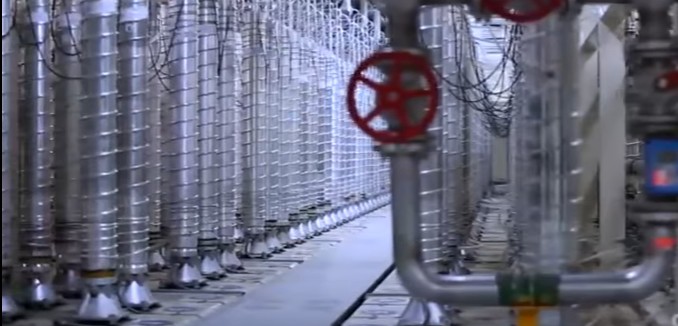During a dramatic press conference Monday, Israeli Prime Minister Benjamin Netanyahu revealed that Israeli agents had broken into a secret Iranian facility and spirited out a half ton of documents showing the history and extent of Iran’s nuclear weapon program. The evidence, Netanyahu said, showed conclusively that Iran had lied about pursuing nuclear weapons.
One of the more typical responses critics have had to Netanyahu’s presentation is to dismiss it as being nothing new.
For example, Richard Nephew, who worked for the State Department and was part of the team that negotiated the 2015 nuclear deal with Iran told The Washington Post that the Israeli intelligence was “interesting, and important for building a history of [Iran’s] program. But it is not a new revelation, at least in terms of where the program was when we were negotiating.”
It is precisely because Iran had such an extensive nuclear weapons program that “we negotiated the JCPOA,” he added, referring to the deal, which is formally called the Joint Comprehensive Plan of Action, by its initials.
Darryl Kimball, executive director of the Arms Control Association, told the Post that what Netanyahu said was “not news,” and added, “The fact that Iran has experimented with nuclear warhead designs, and had at one point an active weapons program, makes it all the more essential that the JCPOA remains in place to prevent Iran from quickly amassing enough fissile material for even one bomb.”
Both Nephew and Kimball are missing the point. Netanyahu’s presentation wasn’t just important because of the contents of those files that were found in Tehran, but that they existed at all.
Emily Landau, a Senior Research Fellow and head of the Arms Control and Regional Security Program at the Institute for National Security Studies (INSS), explained this in a conference call hosted by The Israel Project on Monday. Landau explained one of the reasons why Netanyahu’s presentation was important, was that though Netanyahu did not provide a “smoking gun” showing that Iran had continued its weapons work “it’s quite indicative that all the plans, all these archives, were kept in this secret facility in a very orderly fashion.” The documents could be used to reconstitute a nuclear weapons program.
Landau said that this was important, “because a country that has made a strategic u-turn in the nuclear realm,” would not have kept “those archives in secret facilities with all the details.”
Landau added that when Libya decided to join all the international treaties governing weapons of mass destruction in 2003, it allowed American inspectors to take components of their nuclear program and analyze them in the United States.
Similarly, in a tweet the Institute for Science and International Security asked, “why preserve and extend such extensive archives if Iran never plans to build nuclear weapons?”
That Iran would keep the information necessary to reconstitute its nuclear weapons program also recalls one of Netanyahu’s warnings in his March 2015 speech to Congress opposing the nuclear deal. In the speech Netanyahu warned, “Iran could get to the bomb by keeping the deal. Because virtually all the restrictions on Iran’s nuclear program will automatically expire in about a decade.”
In his statement about Netanyahu’s press conference, Secretary of State Mike Pompeo observed, “Iran had many opportunities over the years to turn over its files to international inspectors from the IAEA (International Atomic Energy Agency) and admit its nuclear weapons work. Instead, they lied to the IAEA repeatedly.” The failure to turn over these crucial documents showed that “the deal was not constructed on a foundation of good faith or transparency.”
Critics of the JCPOA have pointed out that Iran was not forthcoming with the IAEA in accounting for its past nuclear research prior to implementation of the deal. Despite Iran’s lack of candor and the inability of the IAEA to get all questions about Iran’s nuclear program answered, the agency’s board of governors voted to close the investigation in December 2015 and get on with implementing the JCPOA a month later.
Despite the deal, the IAEA was unable to get a complete accounting of Iran’s past nuclear weapons work, but a team of Israeli agents was able to two years later.
Failing to give a full accounting of its past nuclear weapons work isn’t the only example of Iran stonewalling the IAEA.
In September 2015, Iran took samples from its Parchin military site, while monitored by IAEA inspectors. It gave the samples to the inspectors outside the facility and has since refused to open up any military facilities to inspection by the IAEA. (The samples were later found to contain uranium particles that the Obama administration conceded were likely part of a nuclear weapons program.) In this case too, no further action was taken.
Though President Barack Obama sold the deal saying, “This deal is not built on trust — it’s built on verification,” the IAEA was unable to learn the full scope of Iran’s nuclear weapons research, or even conduct an onsite inspection of a suspicious site. These incidents show that the verification regime of the JCPOA is not airtight.
Netanyahu said that the information he presented on Monday reflected only a “fraction” of the information documenting Iran’s nuclear weapons program. The Institute for Science and International Security reported that the documents contained a “surprising amount of information that was not previously known by Israeli, Western intelligence, or the IAEA about Iran’s nuclear weapons program.”
Iran has found that the world was willing to tolerate its delaying tactics and obfuscation to avoid revealing the full extent of its nuclear weapons research.
Following the Israeli intelligence coup, the question arm controllers should be asking is “what other nuclear secrets is Iran hiding,” not declaring that there’s nothing new in the revelations.
[Photo: Persian_boy / YouTube]




